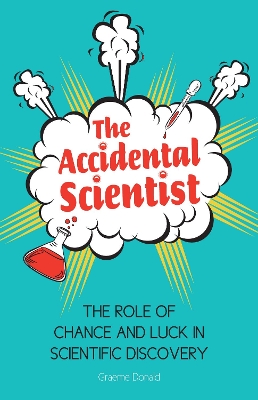
Have you ever wondered how the ideas for some things come about? Surprisingly often it is as much down to chance as a single person's brilliance. The Accidental Scientist explores the role of chance and error in scientific, medical and commercial innovation, outlining exactly how some of the most well-known products, gadgets and useful gizmos came to be. From the jacuzzi to jeans and TNT to Tipp-Ex, this book explores many of the discoveries that we are all so familiar with today, yet have the most interesting origins because of the story behind them. Not all discoveries require brilliance, and as The Accidental Scientist demonstrates, sometimes a special ingredient is needed: luck.
I thoroughly enjoyed this book. With reservations. I learned three things I didn't know in the first paragraph of the introduction, so needless to say I was off to a ripping good start.
(Showing the gaping holes in my knowledge of history I didn't know that 1. Serendip used to be the name of Sri Lanka, 2. that the UK didn't officially have a "Prime Minister" until 1937 - before that the title was First Lord of the Treasury - and 3. that the word 'serendipity' was invented by Horace Walpole.)
I continued to learn a lot, as Donald skipped across a variety of scientific and engineering advancements that were found accidentally rather than searched for. Some I'd heard before: the invention of the Post-it note, lobotomies, and LSD; some were completely new: Starlight (a material that can withstand temps over 3,000C but whose formulation died with its creator), Pykrete (would this work on the ice caps?), and cellulose. The section on cellulose was my favorite - I laughed out loud at the end of it. And a lot of sections covered topics I was familiar with, but learned a lot more about. I had NO idea Hedy Lamar slept with both Hitler and Mussolini, which has no bearing on the topic at hand but still...I did not know that. And IBM should be eternally ashamed of their early history. After reading that section I'm damn happy Apple stole their mouse technology back in the 70's.
The writing was engaging too, but here's where my reservations start to come into play, because what makes the writing so fun to read also makes the integrity of the information questionable. Donald does not hold back. He's witty, he's dry in the best possible way, and he's not at all un-biased. It's refreshing, but it's also un-nerving when it's in a work chronicling scientific advancements. A glaring example of this candidness being a problem is when he bluntly calls Coco Chanel a nazi agent. As I've mentioned, I have huge holes in my historical knowledge, but from what I've read there's no conclusive evidence one way or the other as to Chanel's definitive guilt. Or, at least, there was evidence that pointed in both directions. If that's still the case, it's irresponsible to condemn her as he does. There's a short bibliography in the back, but no notes, so I can't easily track down his source for this statement.
There are two other errors made in the text that should have been caught by anybody with general scientific knowledge. In the section on Darwin (in which he is weirdly harsh and determined to make Darwin sound useless and lazy), he refers to the Galapagos 'Turtles'. They're tortoises. There's a distinct biological difference. And in the section on scurvy he refers to "95% proof" rum. Either it's 95 proof, which is 47.5% alcohol by volume, or it's 95% alcohol (by vol) – in which case everybody on board ship would be dead after their first day's rum rations – but saying 95% proof is like saying I'm 5ft173cm tall.
For all my reservations, I still really enjoyed the read and I tortured MT with a constant stream of "listen to this!". It turns out that I, by pure coincidence, have another of his books on my TBR that's been there for years. Now that I know I can look forward to entertaining writing, I'll be picking it up sooner rather than later. But I will be reading it with a certain level of caution.
Reading updates
-
Started reading
-
6 January, 2018:
Finished reading
-
6 January, 2018:
Reviewed
